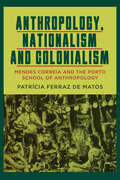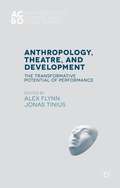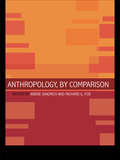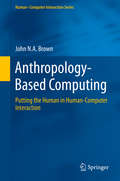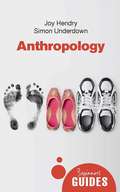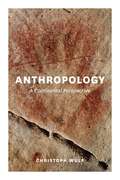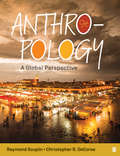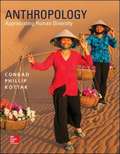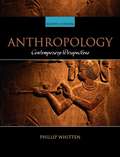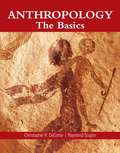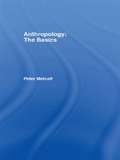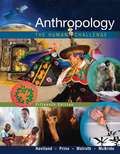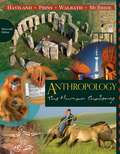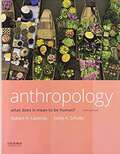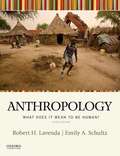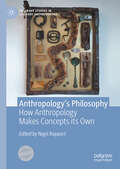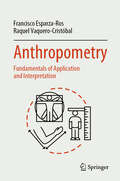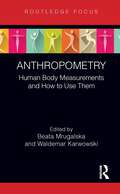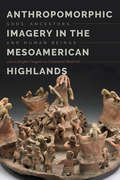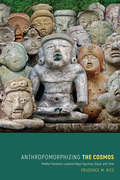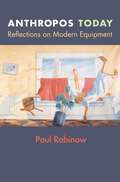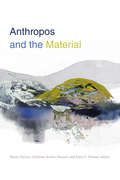- Table View
- List View
Anthropology, Nationalism and Colonialism: Mendes Correia and the Porto School of Anthropology
by Patrícia Ferraz de MatosA major contribution to the history of European anthropology, this book highlights the Porto School of Anthropology and analyses the work of its main mentor, Mendes Correia (1888-1960). It goes beyond a Portuguese focus to present a wider comparative analysis in which the colonial empire, knowledge of origins, ethnic identity and cultural practices all receive special attention. The analysis takes into account the fact that nationalism, as associated with an ethno-racial paradigm, decisively influenced discourse and scientific and political practices.
Anthropology, Theatre, and Development
by Alex Flynn Jonas TiniusFrom Pussy Riot and the Arab Spring to Italian mafia dance, this collection provides an interdisciplinary analysis of relational reflexivity in political performance. By putting anthropological theory into dialogue with international development scholarship and artistic and activist practices, this book highlights how aesthetics and politics interrelate in precarious spheres of social life. The contributors of this innovative interdisciplinary volume raise questions about the transformativepotential of participating in and reflecting upon political performances both as individual and as collectives. They also argue that such processes provide a rich field and new pathways for anthropological explorations of peoples' own reflections on humanity, sociality, change, and aspiration. Reflecting on political transformations through performance puts centre stage the ethical dimensions of cultural politics and how we enact political subjectivity.
Anthropology, by Comparison
by Richard G. Fox Andre GingrichComparison has long been the backbone of the discipline of anthropology. But recent developments in anthropology, including critical self-reflection and new case studies sited in a globalized world, have pushed comparative work aside. For the most part, comparison as theory and method has been a casualty of the critique of 'grand theory' and of a growing mistrust of objectivist, hard-science methodology in the social sciences.Today it is time for anthropology to resume its central task of exploring humankind through comparison, using its newfound critical self-awareness under changing global conditions. In Anthropology By Comparision, an international group of prominent anthropologists re-visits, re-theorizes and re-invigorates comparison as a legitimate and fruitful enterprise. The authors explore the value of anthropological comparison and encourage an international dialogue about comparative research. While rejecting older, universalist comparative methods, these scholars take a fresh look at various subaltern and neglected approaches to comparison from their own national traditions. They then present new approaches that are especially relevant to the globalized world of the twenty-first century.Every student and practitioner of anthropology and the social sciences will find this thought-provoking volume essential reading. Anthropology, by Comparison is a call to creative reflection on the past and productive action in the present, a challenge to anthropologists to revitalize their unique contribution to human understanding. Anthropology, by Comparison is an indispensable overview of anthropology's roots - and its future - with regard to the comparative study of humankind.
Anthropology-Based Computing: Putting the Human in Human-Computer Interaction (Human–Computer Interaction Series #0)
by John N.A. BrownWe have always built tools to improve our productivity and help us lead better lives; however we find ourselves constantly battling against our new computerized tools, making us less productive and putting our health and our lives at risk. This book looks at Human-Computer Interaction (HCI) from a truly human-centred perspective; focusing on human physiology and psychology rather than the motley series of brilliant innovations, glorified mistakes, and cross-generational habits that comprise the computer-centred HCI that we practice today. This three-part guide argues that human interest and calm technology need to be at the heart of HCI. It begins by exposing the inherent dangers in past and present HCI. Using his past experiences within Anthropology, Linguistics, Education, Ergonomics, Human Factors, and Computer Science the author introduces and explores the theory of 'Anthropology-Based Computing' (ABC) as well as a new ideas like Dynamic Environmental Focus (DEF), a new model of General Human Interaction (GHI), and a new triune model of the brain: Brown's Representation of Anthropogenic Interaction in Natural Settings (BRAINS). Detailed illustrations show how HCI can be improved by considering how human bodies and brains actually work. The final part is a series of simple illustrated experiments, each applying an aspect of ABC to improve the way our computers and computerized devices treat us. Anthropology-Based Computing is written for those who work with computers, not just those who work on them. Students and researchers in Design and Psychology, and Computer Scientists as well, will benefit from seeing what is missing from the devices that are already in place, why that is, and how to make the practical changes that will immediately improve the physiological and psychological experience of using phones, on-board navigation systems, and the countless other computers we use at work and at home today and will continue to use in the future.
Anthropology: A Beginner's Guide (Beginner's Guides)
by Joy Hendry Simon UnderdownThe first introductory guide to explore both biological and cultural approaches to the study of humanity, from the origin of our species, to traits that we all share, to the vast range of our sacred rites and rituals. Hendry and Underdown bring anthropology to life with case studies, explaining why witchcraft was so feared in colonial Salem but embraced in Sudan and elsewhere and what our relationship with mobile phones (and even the bathroom) tells us about ourselves. Joy Hendry is Professor of Social Anthropology at Oxford Brookes University in the UK and is author of Sharing Our Worlds: An Introduction to Social Anthropology. Simon Underdown is Senior Lecturer in Biological Anthropology also at Brookes University in Oxford.
Anthropology: A Continental Perspective
by Christoph WulfOriginally published in German, Christoph Wulf’s Anthropology sets its sights on a topic as ambitious as its title suggests: anthropology itself. Arguing for an interdisciplinary and intercultural approach to anthropology that incorporates science, philosophy, history, and many other disciplines, Wulf examines—with breathtaking scope—all the ways that anthropology has been understood and practiced around the globe and through the years. Seeking a central way to understand anthropology in the midst of many different approaches to the discipline, Wulf concentrates on the human body. An emblem of society, culture, and time, the body is also the result of many mimetic processes—the active acquisition of cultural knowledge. By examining the role of the body in the performance of rituals, gestures, language, and other forms of imagination, he offers a bold new look at how culture is produced, handed down, and transformed. Drawing such examinations into a comprehensive and sophisticated assessment of the discipline as a whole, Anthropology looks squarely at the mystery of humankind and the ways we have attempted to understand it.
Anthropology: A Global Perspective
by Raymond Urban Scupin Christopher Raymond DeCorseNow with SAGE Publishing! Using state-of-the-art research, Anthropology: A Global Perspective introduces students to the four core subfields of anthropology and applied anthropology. Integrating material from each subfield, this comprehensive text is founded on four essential themes: the diversity of human societies; the similarities that tie all humans together; the interconnections between the sciences and humanities; and a new theme addressing psychological essentialism. Authors Raymond Scupin and Christopher R. DeCorse demonstrate how anthropologists use research techniques and methods to help solve practical problems and show readers how anthropology is relevant to improving human societies.
Anthropology: A Global Perspective
by Raymond Urban Scupin Christopher Raymond DeCorseNow with SAGE Publishing! Using state-of-the-art research, Anthropology: A Global Perspective introduces students to the four core subfields of anthropology and applied anthropology. Integrating material from each subfield, this comprehensive text is founded on four essential themes: the diversity of human societies; the similarities that tie all humans together; the interconnections between the sciences and humanities; and a new theme addressing psychological essentialism. Authors Raymond Scupin and Christopher R. DeCorse demonstrate how anthropologists use research techniques and methods to help solve practical problems and show readers how anthropology is relevant to improving human societies.
Anthropology: Appreciating Human Diversity
by Conrad Phillip KottakA leading name in anthropology, Conrad Philip Kottak continues to define student learning in the general anthropology course. Anthropology: Appreciating Human Diversity offers an up-to-date holistic introduction to general anthropology from the four-field perspective. Key themes of appreciating the experiences students bring to the classroom, appreciating human diversity, and appreciating the field of anthropology are showcased throughout the text. Focusing on an increasingly interconnected world, the new Focus on Globalization essays examine topics as diverse as tourism in the ancient and modern worlds, global disease pandemics, world events (including the Olympics and the World Cup), and the expansion of international finance and branding. Connect is the only integrated learning system that empowers students by continuously adapting to deliver precisely what they need, when they need it, and how they need it, so that your class time is more engaging and effective.
Anthropology: Contemporary Perspectives
by Phillip WhittenThis collection of short readings on all aspects of anthropology conveys the excitement and relevance of contemporary anthropology. This book organizes readings around the major subdisciplines within anthropology: biological anthropology, cultural anthropology, archaeology, and language and communication, making it easy to notice trends and themes. For anyone with an interest in anthropology.
Anthropology: The Basics
by Raymond Scupin Christopher R. DeCorseExplore the similarities and differences that characterize humanity Anthropology: The Basics provides a concise introduction to the subfields of anthropology, designed for instructors who want an overview of key concepts, to which they can add supplementary case studies and readings. Incorporating both classic and current research, authors Christopher DeCorse and Raymond Scupin lead students to examine the similarities across cultures, as well as the differences among different peoples. Exploring interactions between anthropology and other fields, Anthropology: The Basics awakens students to anthropology’s unique, holistic perspective—sparking the critical imagination that brings learning to life.
Anthropology: The Basics (The Basics)
by Peter MetcalfThe ultimate guide for the student encountering anthropology for the first time, Anthropology: The Basics explains and explores key anthropological concepts including: what is anthropology? how can we distinguish cultural differences from physical ones? what is culture, anyway? how do anthropologists study culture? what are the key theories and approaches used today? How has the discipline changed over time? This student-friendly text provides an overview of the fundamental principles of anthropology and is an invaluable guide for anyone wanting to learn more about this fascinating subject.
Anthropology: The Human Challenge
by Dana Walrath William Haviland Harald Prins Bunny McBrideWith compelling photos, engaging examples, conceptual tools, and select studies by anthropologists in far-flung places, the authors of ANTHROPOLOGY: THE HUMAN CHALLENGE, 15th Edition, provide a holistic view of anthropology to help you gain a deeper and more comprehensive understanding of our complex world. You'll discover the different ways humans face the challenge of existence, the connection between biology and culture in the shaping of human behavior, and the impact of globalization on peoples and cultures around the world.
Anthropology: The Human Challenge
by William A. Haviland Harald E. L. Prins Bunny Mcbride Dana WalrathThis book offers a comprehensive and balanced presentation on views of human culture, evolution, and prehistory. The text presents the principles and processes of anthropology, both physical (biological) and cultural, including ethnology, linguistics, and prehistoric archaeology in an integrated, holistic manner. The book's framework emphasizing the challenge of human survival, the connections between biology and culture, and the impact of globalization on peoples and cultures around the world, serves to unify the material. The authors integrate contemporary research and ideas from several schools of thought, and use a lively writing style to engage readers and keep them interested in "real world" anthropology.
Anthropology: The Human Challenge
by William A. Haviland Harald E. L. Prins Bunny Mcbride Dana WalrathThis book offers a comprehensive and balanced presentation on views of human culture, evolution, and prehistory. The text presents the principles and processes of anthropology, both physical (biological) and cultural, including ethnology, linguistics, and prehistoric archaeology in an integrated, holistic manner. The book's framework emphasizing the challenge of human survival, the connections between biology and culture, and the impact of globalization on peoples and cultures around the world, serves to unify the material. The authors integrate contemporary research and ideas from several schools of thought, and use a lively writing style to engage readers and keep them interested in "real world" anthropology.
Anthropology: The Human Challenge
by Dana Walrath William Haviland Harald PrinsNIMAC-sourced textbook <P><P>Discover an exciting survivor of the Pleistocene and ingenious creator of the Anthropocene -- Homo sapiens. Yes, that's you! And over seven billion other members of your own species currently dispersed across the entire earth (and a few even in space). With compelling photos, engaging examples, conceptual tools, and select studies by anthropologists in far-flung places, the authors of ANTHROPOLOGY: THE HUMAN CHALLENGE, 15th Edition, provide a holistic view of anthropology to help you gain a deeper and more comprehensive understanding of our complex world. You'll discover the different ways humans face the challenge of existence, the connection between biology and culture in the shaping of human behavior, and the impact of globalization on peoples and cultures around the world.
Anthropology: What Does It Mean To Be Human?
by Robert H. Lavenda Emily A. SchultzA unique alternative to more traditional, encyclopedic introductory texts, Anthropology: What Does It Mean to Be Human?, Fifth Edition, takes a question-oriented approach that incorporates cutting-edge theory and new ways of looking at important contemporary issues such as power, human rights, and inequality. <p><p>With a total of sixteen chapters, this engaging, full-color text is an ideal one-semester overview that delves deep into anthropology without overwhelming students.
Anthropology: What Does It Mean to Be Human?
by Robert H. Lavenda Emily A. SchultzA unique alternative to more traditional, encyclopedic introductory texts, Anthropology: What Does It Mean to Be Human?, Third Edition, takes a question-oriented approach that incorporates cutting-edge theory and new ways of looking at important contemporary issues such as power, human rights, and inequality. With a total of sixteen chapters, this engaging, full-color text is an ideal one-semester overview that delves deep into anthropology without overwhelming students.
Anthropology’s Philosophy: How Anthropology Makes Concepts its Own (Palgrave Studies in Literary Anthropology)
by Nigel RapportThis book focuses on anthropology's ambition for comprehensiveness and its interdisciplinary nature. It consists of concise essays, each around 2,500 words, in which contributors examine how concepts traditionally linked to philosophy or other disciplines are interpreted and applied within anthropology. Each contributor selects a personally inspiring concept and illustrates its relevance to anthropology, showcasing how it takes on new meaning within an anthropological framework. These essays vary in style and content, allowing contributors to discuss the history of the concept’s usage, provide an ethnographic illustration of the concept, or offer an analytical, comparative or theoretical exposition of the concept as deployed anthropologically. A common theme across all entries is the exploration of anthropological disciplinarity — or 'anti-disciplinarity' — highlighting its intellectual flexibility and genre-blurring practices, in an effort to approach that expansiveness necessary to do justice to the complexity of human existence.
Anthropometry: Fundamentals of Application and Interpretation
by Francisco Esparza-Ros Raquel Vaquero-CristóbalThe science of Anthropometry is gaining an increasing number of followers, as it allows for a valid, reliable and cheap assessment of body composition and other interesting variables from the point of view of health and sport. However, not many books have addressed the anthropometric technique from its foundations. This book deals with issues to consider during an anthropometric assessment, such as the physical approach to the subject during the anthropometric assessment, or the factors to consider so that the data obtained are valid and reliable. It also clearly and concisely addresses the approach to body composition with anthropometry, what somatotype is, and how it is interpreted, and how anthropometry can be used to obtain proportionality values, which are very useful for the detection of sporting talents. Finally, the application of anthropometry in two of the fields where anthropometry is most used: the field of sport from the basics to elite sport, and health. All of this is conducted under the perspective of two of the world's leading experts in kinanthropometry, with the goal for the reader to acquire knowledge on every aspect of anthropometry, from the basics to in-depth knowledge of this science.
Anthropometry: Human Body Measurements and How to Use Them (Body of Knowledge in Human Factors and Ergonomics)
by Waldemar Karwowski Beata MrugalskaToday, human factors and ergonomics professionals worldwide contribute to the design and evaluation of tasks, jobs, products, environments, and systems in order to make them compatible with the needs, abilities, and limitations of people. By understanding anthropometry, professionals can ensure that our home and working environments are comfortable and designed with the human in mind. This book aims to show how an understanding of anthropometrics can influence workspace design, ergonomics in the office, ergonomics in the home, and health and safety at work. This book discusses the measurement of the human body and human variability. Anthropometry may seem to be relatively simple but the reality is that it focuses on very sophisticated aspects of how to make the products tailor-made to suit specific requirements. As a study, it is useful for a variety of purposes such as workspace design, ergonomics in the office, ergonomics in the home, and health and safety at work. These eleven chapters investigate anthropometrics and bridge the gap between theory and practice. Each chapter is supported by tables, charts, and illustrations, and a wide list of bibliographic references. The reader will develop new insights into the principles and practice of anthropometrics with this book bringing the topic right up to date. Anthropometry: Human Body Measurements and How to Use Them will be of interest to students, graduates, teachers, researchers, and general workers in industrial design, ergonomics, rehabilitation, safety, and health.
Anthropomorphic Imagery in the Mesoamerican Highlands: Gods, Ancestors, and Human Beings
by Brigitte Faugère Christopher BeekmanIn Anthropomorphic Imagery in the Mesoamerican Highlands, Latin American, North American, and European researchers explore the meanings and functions of two- and three-dimensional human representations in the Precolumbian communities of the Mexican highlands. Reading these anthropomorphic representations from an ontological perspective, the contributors demonstrate the rich potential of anthropomorphic imagery to elucidate personhood, conceptions of the body, and the relationship of human beings to other entities, nature, and the cosmos. Using case studies covering a broad span of highlands prehistory—Classic Teotihuacan divine iconography, ceramic figures in Late Formative West Mexico, Epiclassic Puebla-Tlaxcala costumed figurines, earth sculptures in Prehispanic Oaxaca, Early Postclassic Tula symbolic burials, Late Postclassic representations of Aztec Kings, and more—contributors examine both Mesoamerican representations of the body in changing social, political, and economic conditions and the multivalent emic meanings of these representations. They explore the technology of artifact production, the body’s place in social structures and rituals, the language of the body as expressed in postures and gestures, hybrid and transformative combinations of human and animal bodies, bodily representations of social categories, body modification, and the significance of portable and fixed representations. Anthropomorphic Imagery in the Mesoamerican Highlands provides a wide range of insights into Mesoamerican concepts of personhood and identity, the constitution of the human body, and human relationships with gods and ancestors. It will be of great value to students and scholars of the archaeology and art history of Mexico. Contributors: Claire Billard, Danièle Dehouve, Cynthia Kristan-Graham, Melissa Logan, Sylvie Peperstraete, Patricia Plunket, Mari Carmen Serra Puche, Juliette Testard, Andrew Turner, Gabriela Uruñuela, Marcus Winter
Anthropomorphizing the Cosmos: Middle Preclassic Lowland Maya Figurines, Ritual, and Time
by Prudence M. RiceAnthropomorphizing the Cosmos explores the sociocultural significance of more than three hundred Middle Preclassic Maya figurines uncovered at the site of Nixtun-Ch'ich' on Lake Petén Itzá in northern Guatemala. In this careful, holistic, and detailed analysis of the Petén lakes figurines—hand-modeled, terracotta anthropomorphic fragments, animal figures, and musical instruments such as whistles and ocarinas—Prudence M. Rice engages with a broad swath of theory and comparative data on Maya ritual practice. Presenting original data, Anthropomorphizing the Cosmos offers insight into the synchronous appearance of fired-clay figurines with the emergence of societal complexity in and beyond Mesoamerica. Rice situates these Preclassic Maya figurines in the broader context of Mesoamerican human figural representation, identifies possible connections between anthropomorphic figurine heads and the origins of calendrics and other writing in Mesoamerica, and examines the role of anthropomorphic figurines and zoomorphic musical instruments in Preclassic Maya ritual. The volume shows how community rituals involving the figurines helped to mitigate the uncertainties of societal transitions, including the beginnings of settled agricultural life, the emergence of social differentiation and inequalities, and the centralization of political power and decision-making in the Petén lowlands. Literature on Maya ritual, cosmology, and specialized artifacts has traditionally focused on the Classic period, with little research centering on the very beginnings of Maya sociopolitical organization and ideological beliefs in the Middle Preclassic. Anthropomorphizing the Cosmos is a welcome contribution to the understanding of the earliest Maya and will be significant to Mayanists and Mesoamericanists as well as nonspecialists with interest in these early figurines
Anthropos Today: Reflections on Modern Equipment (In-Formation)
by Paul RabinowThe discipline of anthropology is, at its best, characterized by turbulence, self-examination, and inventiveness. In recent decades, new thinking and practice within the field has certainly reflected this pattern, as shown for example by numerous fruitful ventures into the "politics and poetics" of anthropology. Surprisingly little attention, however, has been given to the simple insight that anthropology is composed of claims, whether tacit or explicit, about anthropos and about logos--and the myriad ways in which these two Greek nouns have been, might be, and should be, connected. Anthropos Today represents a pathbreaking effort to fill this gap. Paul Rabinow brings together years of distinguished work in this magisterial volume that seeks to reinvigorate the human sciences. Specifically, he assembles a set of conceptual tools--"modern equipment"--to assess how intellectual work is currently conducted and how it might change. Anthropos Today crystallizes Rabinow's previous ethnographic inquiries into the production of truth about life in the world of biotechnology and genome mapping (and his invention of new ways of practicing this pursuit), and his findings on how new practices of life, labor, and language have emerged and been institutionalized. Here, Rabinow steps back from empirical research in order to reflect on the conceptual and ethical resources available today to conduct such inquiries. Drawing richly on Foucault and many other thinkers including Weber and Dewey, Rabinow concludes that a "contingent practice" must be developed that focuses on "events of problematization." Brilliantly synthesizing insights from American, French, and German traditions, he offers a lucid, deeply learned, original discussion of how one might best think about anthropos today.
Anthropos and the Material
by Christian Krohn-Hansen Penny Harvey Knut G. NustadThe destructive effects of modern industrial societies have shaped the planet in such profound ways that many argue for the existence of a new geological epoch called the Anthropocene. This claim brings into relief a set of challenges that have deep implications for how relations between the human, the material, and the political affect contemporary social worlds. The contributors to Anthropos and the Material examine these challenges by questioning and complicating long-held understandings of the divide between humans and things. They present ethnographic case studies from across the globe, addressing myriad topics that range from labor, economics, and colonialism to technology, culture, the environment, agency, and diversity. In foregrounding the importance of connecting natural and social histories, the instability and intangibility of the material, and the ways in which the lively encounters between the human and the nonhuman challenge conceptions of liberal humanism, the contributors point to new understandings of the capacities of people and things to act, transform, and adapt to a changing world.
